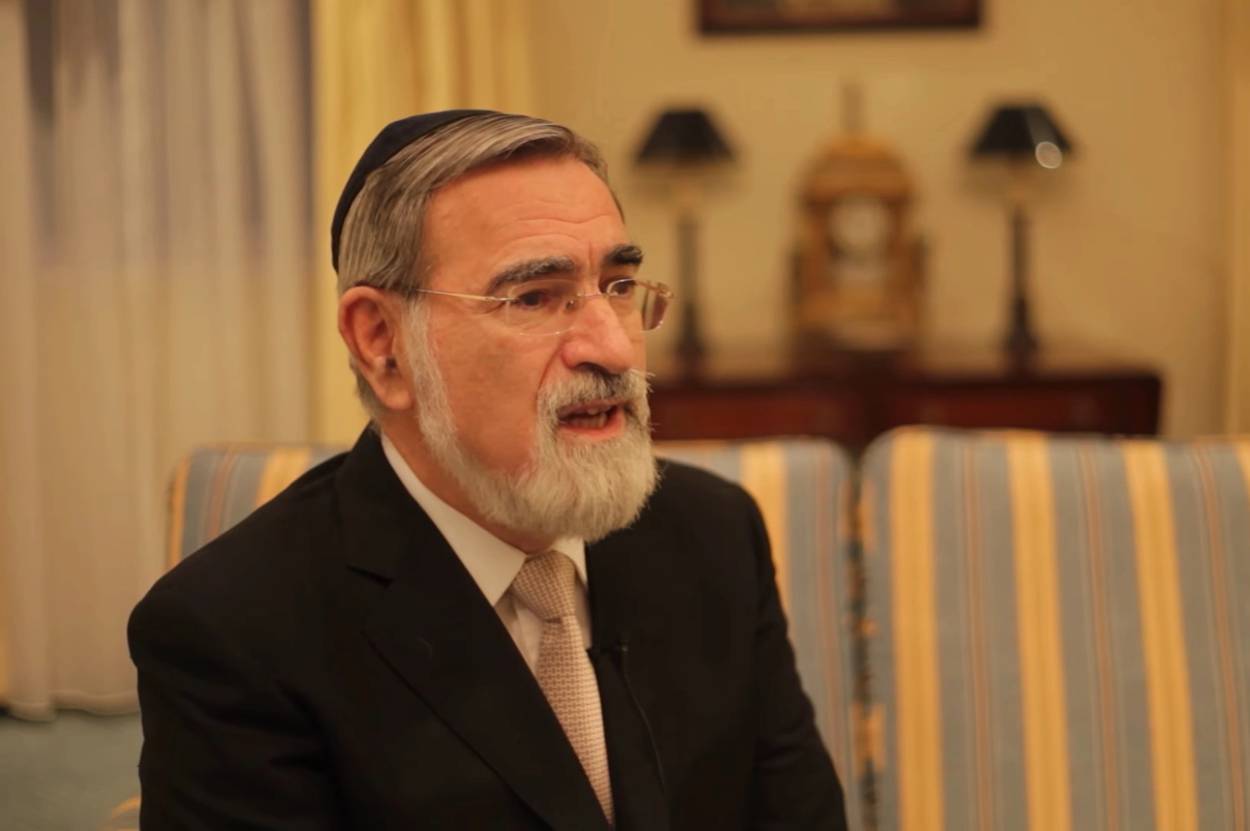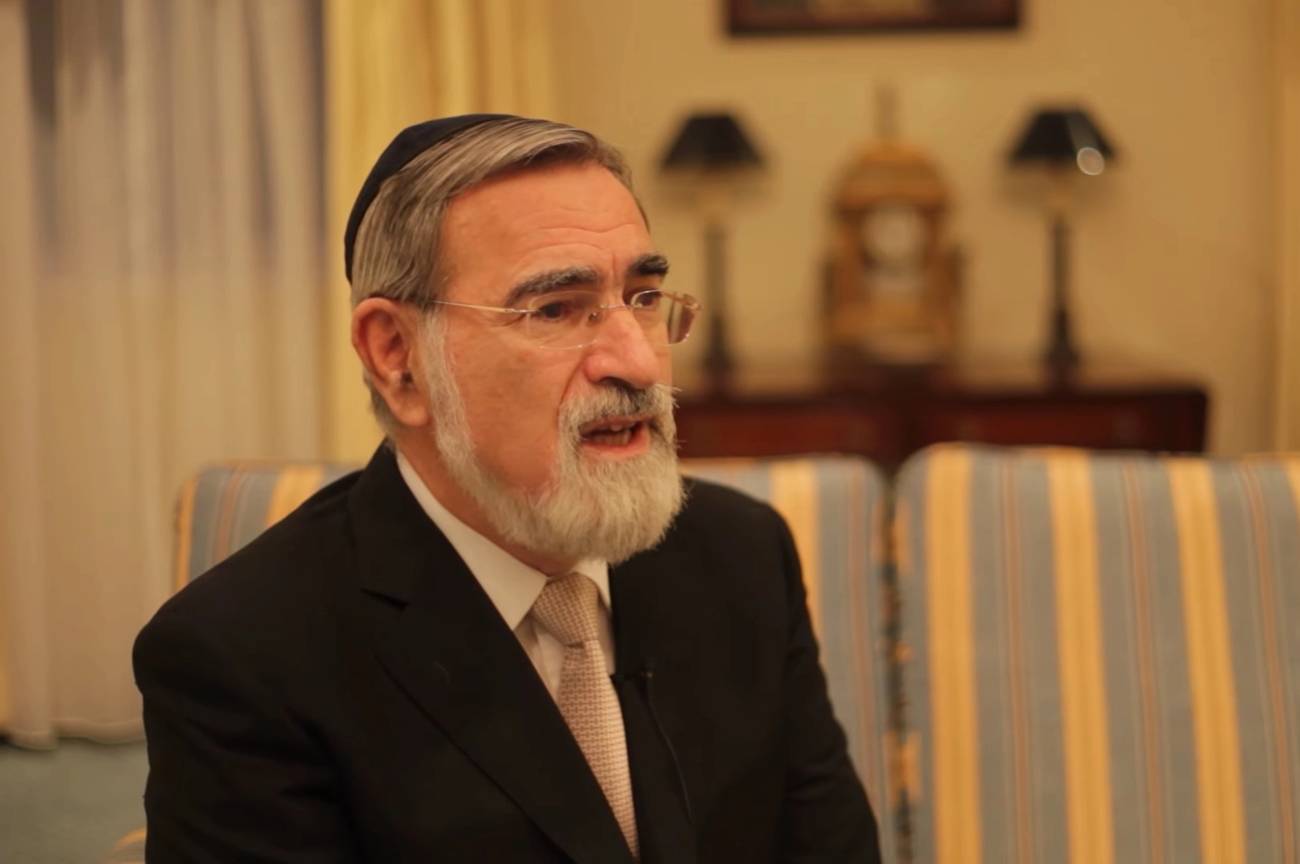Remembering Rabbi Jonathan Sacks (1948-2020)
One of world Jewry’s most influential leaders and communicators passed away over the weekend, leaving an incalculable void




On Nov. 7, the U.S. presidential election was called for Joe Biden. In my neighborhood of New York City, people lined the streets in celebration. Elsewhere in the country, many had the opposite reaction. And on Twitter, President Trump refused to accept the results. In that kind of environment, it’s nearly impossible for any other story to break through, but for many Jewish people, one thing did: Jonathan Sacks, the former chief rabbi of the United Kingdom, passed away on Saturday at the age of 72.
If you haven’t heard of him, and want to get a sense of just how beloved he was, I encourage you to read the replies and comments on the tweet announcing his passing.
There are thousands of heartfelt condolences from everyday people, artists, reporters, politicians, Jews, Christians, Muslims, and none of the above. It’s the very rare rabbi who touches so many souls, especially in this polarizing age with its distrust of organized religion.
For all the tweets, Sacks did not get the send-off he deserved. He was buried in a small socially distanced ceremony that even Britain’s current chief rabbi was unable to attend. It was far from the massive outpouring of mourners and tributes he would have received had he passed in normal times. This piece is my small effort to fill that gap and honor him and his work.
Like so many young Jews, I first encountered Jonathan Sacks when I began asking serious questions about Judaism. At the time, he was the chief rabbi of a community an ocean away, but through his books—he would write dozens, at a pace of one per year—I had access to him as a high school student in New York.
I wasn’t the only one who did this. In college, a friend went to Harvard’s Widener Library, photocopied pages from the first edition of Sacks’ post-9/11 work The Dignity of Difference, and passed them around like contraband. (Rabbi Sacks’ expansive view of religious pluralism—and of the integrity of Christianity and Islam—had upset his ultra-Orthodox constituents at the time, and he subsequently gently revised the book to assuage them, even as he never abandoned his original position.) When he visited the states and spoke at MIT, many of us trekked across Cambridge to hear him.
For 22 years as chief rabbi, Sacks walked a tightrope as an Oxbridge-educated modern Orthodox rabbi tasked with representing a diverse Jewish community, both in official and unofficial capacity. As he wryly put it back in 1991, “There are many great Jewish leaders. There are very few great Jewish followers. So leading the Jewish people turns out to be very difficult.”
His tenure, however, was a success, spanning over two decades. In 2013, he surprised many by retiring as chief rabbi at age 65—not to recede from public life, but to pursue grander ambitions. That’s when I met him.
I interviewed Sacks for the first time shortly after he stepped down. I expected him to deftly sidestep some of my more pointed questions about politics and faith, but he surprised me by tackling most of them head-on. It soon became clear that this was one reason he had decided to depart his post. As he put it, “When you’re no longer captain of the team, you are much more able to express yourself as an individual.” Being freed from institutional constraints enabled him to reach and embrace broader parts of the Jewish community than he could when encumbered by the political sensitivities and geographic limitations of his office. He traveled the globe, taught at Yeshiva University and New York University, and made connections with Jews outside the Orthodox world—many of whom mourned his loss over the weekend.
But for all the tributes from people like me in the media, Sacks didn’t just talk to those with large platforms or celebrity. I know firsthand from friends how he emailed personally with students, elementary school teachers, and others who sought his guidance. I can only imagine the amount of correspondence he must have received, and cannot imagine how he managed to fit it into his schedule between his dozens of books, online videos, and speeches and media appearances around the globe.
For someone like me who struggled just to write this piece, Sacks’ output is truly dizzying. He did whiteboard animation videos explaining Judaism for YouTube. He recorded BBC specials where he interviewed everyone from religious scientists to outspoken atheists. He spoke in the European Parliament about anti-Semitism. He addressed audiences in middle schools, university campuses, and even the Vatican.
Just as important as the substance of his words was the style in which he delivered them. Unlike far too many academics and intellectuals I’ve met, Sacks did not think that good ideas sell themselves. He understood that he had to meet people where they were and put in the time to train himself to be a more effective communicator. After an initial appearance on the BBC, he asked the anchors for feedback and implemented their advice, and became less stiff and more effective on camera. I once listened to his induction ceremony speech in 1991, and was shocked at how much his speaking affect had improved since then. His inimitable voice and comforting cadence—a mellifluous mix of Shakespearean actor and Oxford don—was not a purely natural gift but an acquired one. He later embraced YouTube and social media, not in a kitschy way, but in a sophisticated manner that adapted his thoughts to the medium without dumbing them down. And he recognized that not everyone responds to words, investing significant effort in Britain to foster Jewish music.
Every student of Sacks has their favorite book. To this day, I continue to recommend his credo on the Jewish faith, A Letter in the Scroll, his superb commentary on the Passover Haggada, and his incisive and often subversive meditation on Israel, victimhood, and anti-Semitism, Future Tense. In the last decade, he achieved perhaps his greatest literary success with his series of prayer books, which have been adopted by individuals and congregations across the globe. When my family was locked down for the High Holidays, his commentary and translation of the traditional Rosh Hashana and Yom Kippur prayers were our companion.
When I interviewed Sacks in 2013 and on subsequent occasions, he told me of all the books he planned to publish or had already drafted in early form. “I’ve had a list that I’ve carried around with me for many years, and I have more than 25 still to write,” he said. He ticked some of them off for me: A systematic account of Jewish ethics; a new commentary on the Torah; a comprehensive Orthodox response to modern biblical criticism; a multivolume record of his personal philosophy of Judaism. “These are not books I write because I want to write books; they’re books I write because I want to read them.” Hopefully, several of these already exist in manuscript form, but it’s painful to think of all the things Sacks had left to say that we will never get to hear.
This includes his responses to events that have complicated or challenged his theses on everything from populism to anti-Semitism to Zionism. Sacks constantly revised and refined his theories over the course of his decades of writing, but that work is now left to the rest of us.
On Oct. 15, Sacks’ office announced that he would be taking a break from his work to be treated for cancer. By Nov. 7, he was gone. The suddenness of his passing shocked many. He had just finished an international virtual tour to promote his latest book, and seemed as vibrant as ever. But in retrospect, the very fact that he’d revealed that he had cancer suggested it was quite serious. That’s because Sacks had beaten cancer several times before, but almost never discussed it. In 2013, I believe I was the first reporter to ask him about it, and inquire why someone as prolific as him would be silent on such a significant experience. His answer rings even more powerfully today:
One can learn a lot about Sacks from his many books. But to understand him, it is just as crucial to recognize what’s not in them. Though he seldom mentions it, Sacks battled cancer twice, once in his 30s, and later in his 50s. Yet unlike many other rabbis and scholars of religion, from Rabbi David Wolpe to James Kugel, who incorporated their bouts with cancer into their theological reflections, Sacks makes no reference to it in his voluminous output. I asked why.
“It’s very simple,” he said. “I saw my late father in his 80s go through four, five major operations. This was not cancer, it was hip replacements and those things. And when you have operations in your 80s, they sap your strength. He got weaker and weaker as the decade passed. He was walking on crutches at my induction—he was alive for my induction, and that was very important to me.”
“Now, my late father, alav ha-shalom, didn’t have much Jewish education, but he had enormous emunah [faith],” Sacks continued. “I used to watch him saying Tehillim in the hospital, and I could see him getting stronger. It seemed to me that his mental attitude was ‘I’m leaving this to Hashem. If he sees that it’s time for me to go, then it’s time for me to go. And if he still needs me to do things here, he’ll look after me.’”
“And I adopted exactly that attitude. So on both occasions I felt, if this is the time Hashem needs me up there, thank you very much indeed for my time down here; I’ve enjoyed every day and feel very blessed. And if he wants me to stay and there’s still work for me to do, then he is going to be part of the refu’ah [healing] and I put my trust in him. So there was no test of faith at any point—just these simple moments at which to say, ‘b’yado afkid ruchi’ [‘In his hand, I place my soul’]. That was my thought. And since we say that every day in [the prayer] Adon Olam, I didn’t feel the need to write a book about it. It was for me not a theological dilemma at all.”
“I had faith,” said Sacks, “full stop.”
In May 2013, the United Synagogue in Britain gathered to pay tribute to their departing chief rabbi, Jonathan Sacks. The capstone of the event was a musical performance of a song that Sacks had helped commission years ago, and had since become a viral hit. Set to the traditional words of Oseh Shalom (“May he who makes peace in the heavens make peace among us”), it was performed by cantors and a giant children’s choir—a living testament to the community that Sacks had spent his life to foster and build. They called him onto the stage for the performance, and the joy radiating from his face was captured on video.
I can think of no better send-off than this.
Yehi zikhro barukh. May his memory be a blessing.
Yair Rosenberg is a senior writer at Tablet. Subscribe to his newsletter, listen to his music, and follow him on Twitter and Facebook.